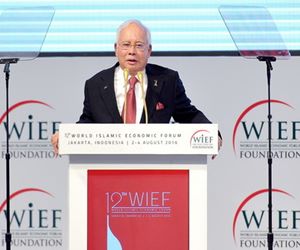JAKARTA, Malaysia - AhlulBayt News Agency - Prime Minister Datuk Seri Najib Tun Razak said today Tuesday, the Muslim world should reject foreign intervention, as it clearly led to devastating results as seen in many countries.
He said the Muslim world must make it clear in rejecting such intervention, which was often based on incomplete, wrong or partisan information.
"We also must reject those who, out of political motivation, call for foreign powers to intervene in their own country.
"We, as the Ummah, will take responsibility for ourselves, and pray for guidance to do so," he said in his special address at the opening of the 12th World Islamic Economic Forum (WIEF), here Tuesday.
The forum, themed, "Decentralising Growth, Empowering Future Business", was opened by Indonesian President Joko Widodo. Also present was WIEF Foundation chairman, Tun Musa Hitam.
Indonesia is hosting the 12th WIEF for the second time after 2009. Previous forums were held in Malaysia, Kazakhstan, Indonesia, Kuwait, Pakistan, the United Kingdom and the United Arab Emirates.
Najib emphasised that foreign intervention in Muslim countries had led to intended and unintended consequences which are still being felt today.
By comparison, he said, majority-Muslim countries such as Malaysia and Indonesia, which have not been subject to foreign intervention, are oases of peace and stability.
"That is why, Muslim world leaders here today, must work to solve our problems and issues together.
"I have always been a proponent of openness in the world and collaboration. But we must insist on respect for our own sovereignty, our own laws, and our own democratically elected governments," said Najib.
He said without political stability, there can be no economic progress and there had been too far much turmoil in the Muslim world in recent years.
Najib cited the invasion of Iraq in particular as having set in motion a disastrous chain of events.
"Chaos, destruction, and the possible break-up of nation states are spectres that have been visited on countries such as Iraq, Syria and Libya.
"The so-called Arab Spring yielded a harvest of instability across the region. Thousands have paid with their lives, while terrorists and other armed militias now roam freely across once secure lands. A Pandora's Box of sectarian conflict has been unleashed" he said.
Taking the opportunity to speak directly to about 2,500 delegates from more than 100 countries around the world, Najib also reiterated that Malaysia stood firmly against Daesh () and its accomplices, both at home and abroad.
For this reason, he said, Malaysia had established a Regional Digital Counter-Messaging Communications Centre just outside Kuala Lumpur, which will soon be operational.
"We will gladly share our expertise in preventing radicalisation, and in helping to deradicalise men and women, who have fallen for the deceit of this wicked, and un-Islamic, group.
"We will be steadfast in this fight, for it concerns us all," he added.
Najib went on to say that Malaysia was also facing the scourge of Daesh, those terrorists who blaspheme Islam by falsely claiming the mantle of an Islamic State.
"There is nothing Islamic about a group that practises such barbarities, and it is crucial that Muslim-majority countries take the lead in condemning them.
"We must fight their lies with the truth about Islam. We must oppose with all our might their attempts to indoctrinate our young people, and take advantage of those on the margins or who have lost their way.
"We must ensure that appropriate legislation is in place to let our security services take all measures necessary to stop attacks before they take place, and root out those who would spread fear and chaos in our lands," he added.
Concluding his speech, Najib said he believed it was also important to clearly state that the 12th WIEF gathering and discussions to be held, represent the true face of the Muslim world.
"Authentic Islam means moderate Islam," he added.
The forum will focus on among others, vital topics relating to sukuk, infrastructure development, halal industries, female empowerment and disruptive technology.
Muslim World Economy Growth
The prime minister also mentioned that amid the thriving global Islamic economy, Muslims are are becoming increasingly active as investors and manufacturers, bankers and traders, competitors and suppliers.
"Muslim consumer spending is also rising as demand increases for ethical finance, investment and insurance services, halal food, modest fashion and halal tourism.
"Even non-Muslims are attracted to the Islamic economy's underlying socially-conscious ethos. There's an opening here for dialogue with the West, which longs in some sectors for a more just and compassionate economy of its own," he added.
According to recent reports, the world's Muslim economy grew at almost double the global rate in 2014/2015, and Muslim consumer spending is set to reach US$2.6 trillion in 2020.
The three-day forum will focus on, among others, sukuk, infrastructure development, halal industries, female empowerment and disruptive technology.
"We seek a world that includes all of our citizens, and shares the proceeds of growth with all.
"One that educates all of our children; one that supports all our entrepreneurs and small and medium-sized businesses; one that prizes knowledge and innovation; and one that appreciates that our diversity is our joy and our strength," he said at the end of his speech.
/

